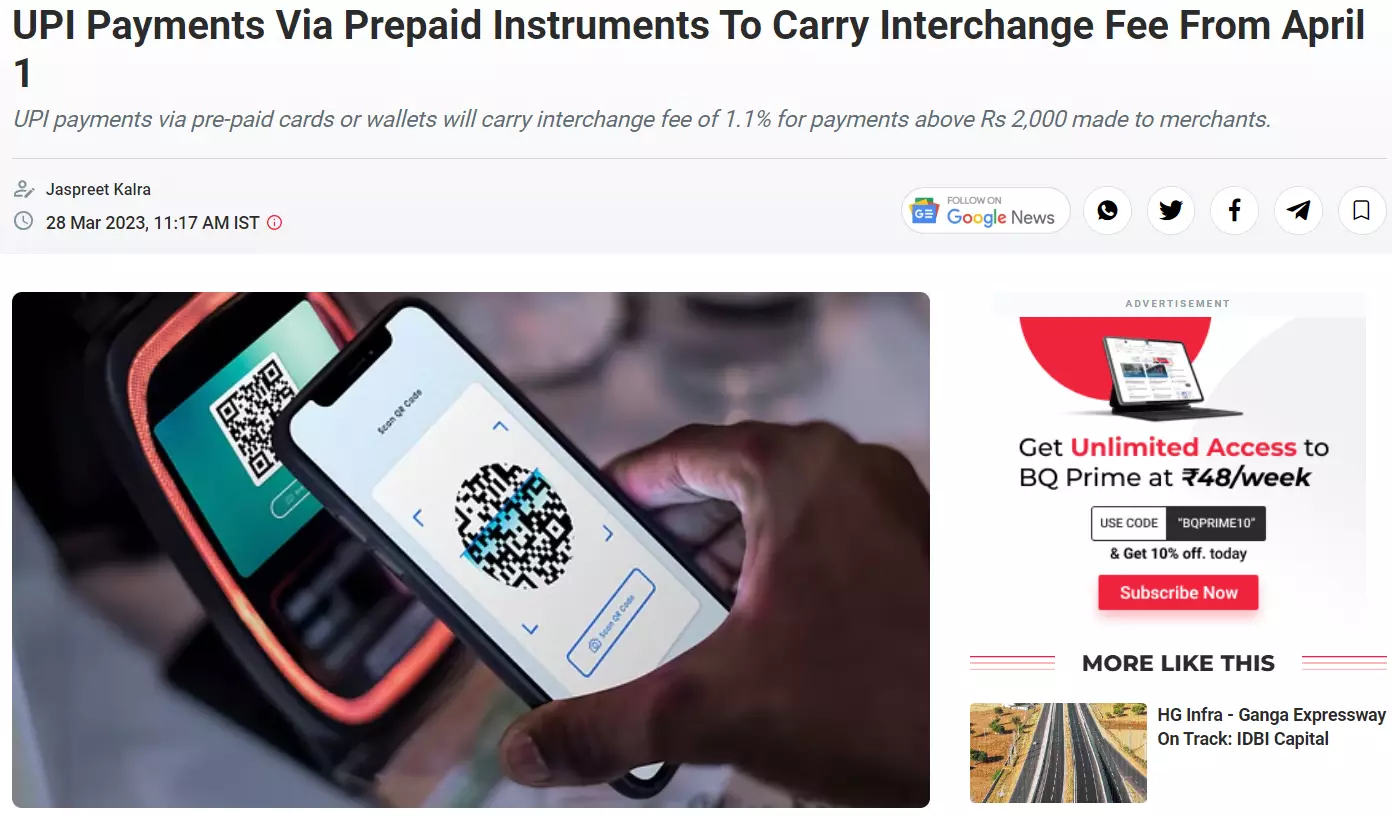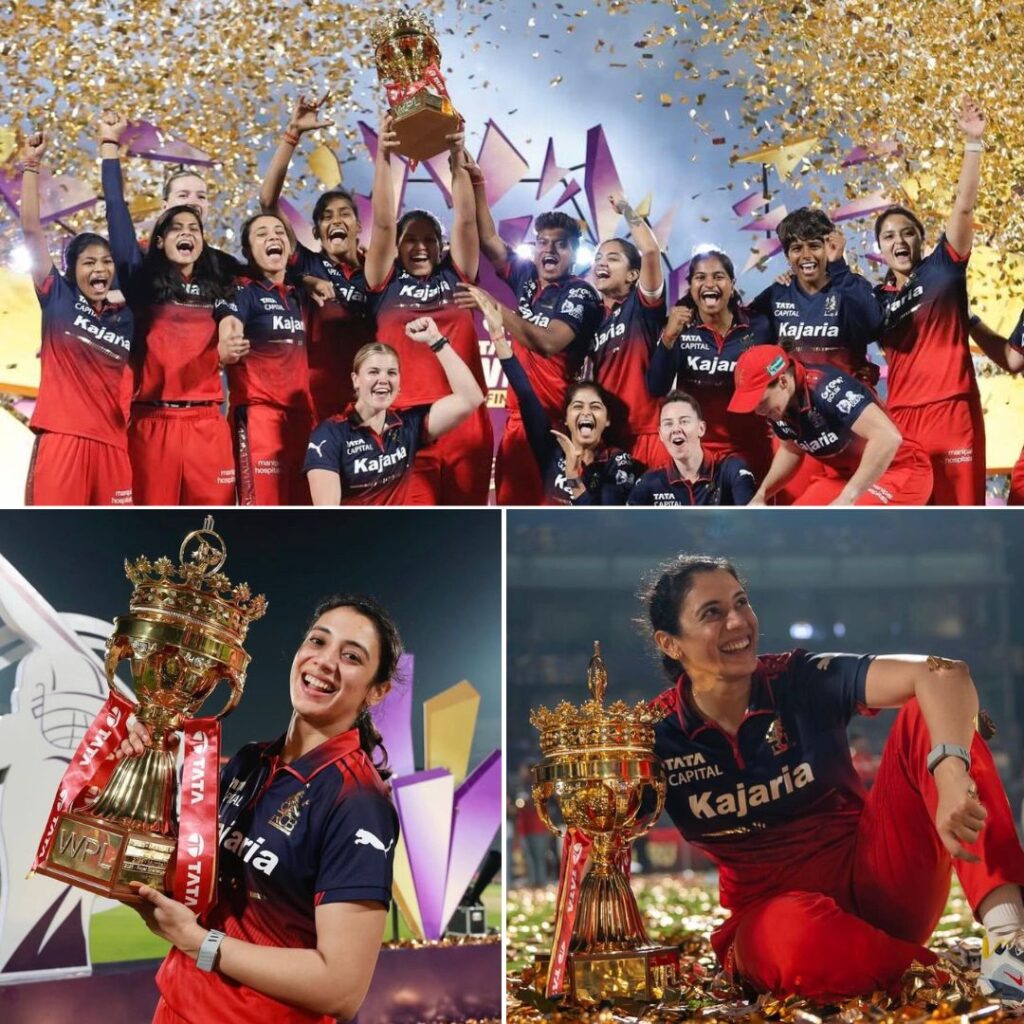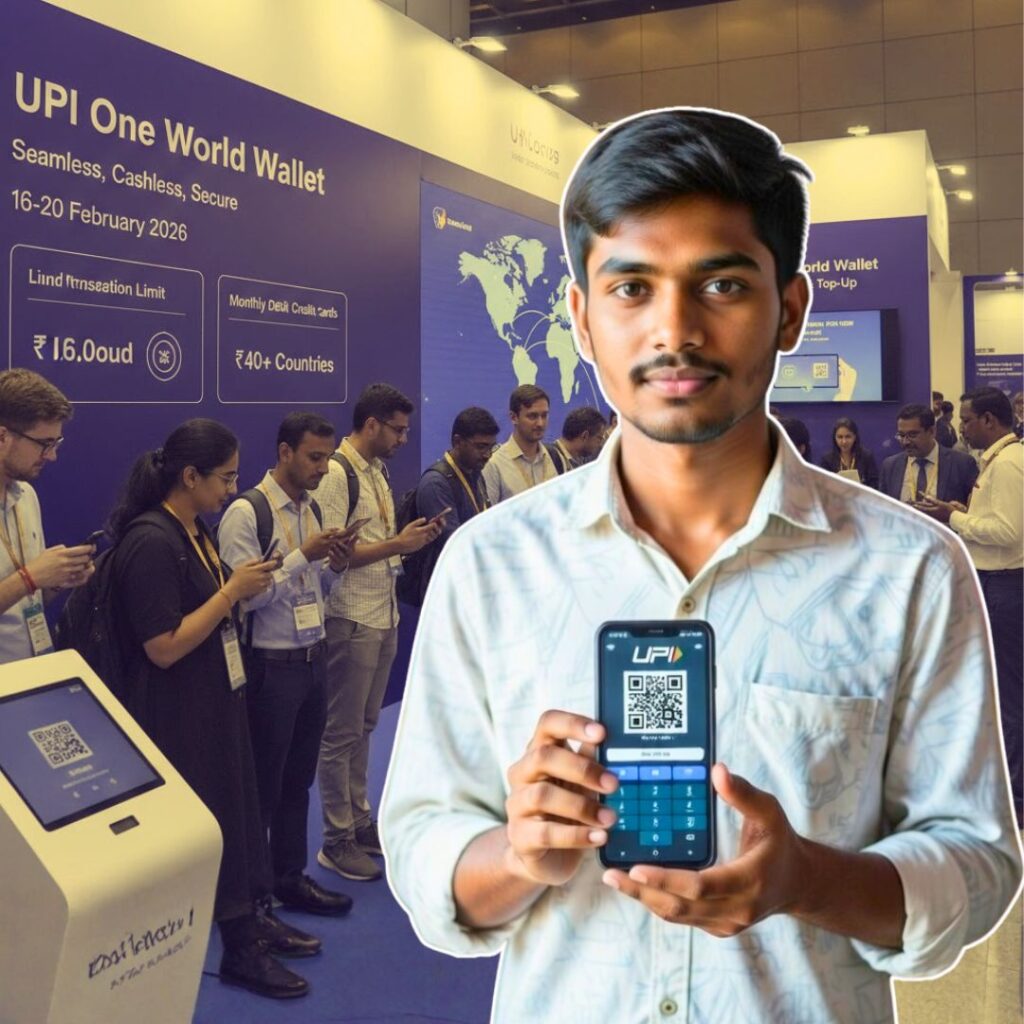A viral claim is widely circulating across social media alleging that from April 1, users will be charged 1.1% for UPI payments exceeding Rs 2000 while using digital payment platforms such as Google Pay, PhonePe, and Paytm.
The claim spread across social media after the Unified Payments Interface announced an interchange of up to 1.1% from April 1 on transactions above Rs 2000 through Prepaid Payment Instrument (PPI) done through UPI. These PPIs include digital wallets, mobile wallets, or prepaid cards like Pockets by ICICI Bank, Paytm Wallet, and Amazon Pay.
Claim:
The Twitter page of Congress Kerala shared a screenshot of a Business Standard article titled, ‘UPI merchant transactions over Rs 2,000 to carry a charge of 1.1% from Apr 1 National Payments Corporation of India, through a circular has recommended Prepaid Payment Instrument charges for UPI payments’.
The claim by Congress Kerala reads, “Digital loot kaal begins. Here is the first part of BJP govt’s secret business plan behind the cashless economy fad. Pay 1.1% extra for all UPI transactions above ₹2000. Wait for more. Modi won’t leave you until he robs the last rupee in your pocket.”
Digital loot kaal begins. Here is the first part of BJP govt’s secret business plan behind the cashless economy fad. Pay 1.1% extra for all UPI transactions above ₹2000. Wait for more. Modi won’t leave you until he robs the last rupee in your pocket. pic.twitter.com/PkrWFsVaL1
— Congress Kerala (@INCKerala) March 29, 2023
Karnataka Congress Seva Dal shared a similar claim with the caption, “Here is your Ache din, Now you have to pay 1% charge on above ₹2000 UPI transactions from 1st April.”
Here are your Ache din, Now you have to pay 1% charge on above ₹2000 UPI transactions from 1st April.
Chargers on UPI transactions are ache din for Modi government. pic.twitter.com/kagy2KopBb
— Karnataka Congress SevaDal (@SevadalKA) March 29, 2023
From April 1, there is news of 1.1% surcharge being imposed on UPI payments like Google Pay, Phone Pe, PayTM on payments above 2000.
You dont have to worry This surcharge money will be useful in the development of the country You will be able to cooperate in further development. pic.twitter.com/nBuGRCmVzS
— ASJAD (اسجد شیخ) (@callmeasjad) March 29, 2023
Fact Check:
We checked a report by Bloomberg Quint on this change. We came across a report titled, ‘UPI Payments Via Prepaid Instruments To Carry Interchange Fee From April 1’. The fee that an acquirer (State Bank of India) has to pay to an issuer (PayTM) is called an interchange fee.
The Bloomberg report notes that a 1.1% fee would be at convenience stores. Insurance would attract a 1% fee subject to a maximum of Rs 10. Telecom and utilities would attract a 0.7% fee each, while supermarkets would attract a 0.9% fee. The fee for mutual funds would attract a 1% fee subject to a maximum of Rs 15, and for agriculture, a 0.7% fee subject to a maximum of Rs 10.

As per the NPCI circular, there will not be any difference for the general public, even for wallet transactions. Taking an example to understand this, suppose a consumer visits a petrol pump where the State Bank of India (SBI) has set up a QR code. The consumer buys petrol worth Rs 4000 and pays for it using the Paytm wallet by scanning the QR code. In this case, SBI will have to pay Paytm an interchange fee of 0.5% of Rs 4000.
However, consumers won’t have to pay anything extra from their wallets. This fee is between the shopkeeper and his bank and won’t be charged to you.
Interchange fees are charges paid by payment service providers (such as banks) to other payment platforms (like digital wallets such as Paytm or Amazon Pay) for using infrastructure provided by the payment service provider. As per the recent NPCI circular, this fee has been changed from 0.5% to 1.1%, depending on what you pay with the UPI wallet.
The interchange fee for categories like fuel, education, and agriculture is 0.5-0.7%, while the interchange fee for food, and specialty retail shops is a maximum of 1.1%.
On March 29, 2023, NPCI published a tweet through which it released a circular. The NPCI circular stated that no charges would be applied to peer-to-peer and peer-to-peer-merchant transactions between bank accounts and PPIs.
NPCI Press Release: UPI is free, fast, secure and seamless
Every month, over 8 billion transactions are processed free for customers and merchants using bank-accounts@EconomicTimes @FinancialXpress @businessline @bsindia @livemint @moneycontrolcom @timesofindia @dilipasbe pic.twitter.com/VpsdUt5u7U— NPCI (@NPCI_NPCI) March 29, 2023
A tweet from PIB Fact Check on March 29 also rejected the viral claim.
.@IndiaToday claims that UPI transactions over Rs 2000 will be charged at 1.1%#PIBFactCheck
➡️There is no charge on normal UPI transactions.➡️@NPCI_NPCI circular is about transactions using Prepaid Payment Instruments(PPI) like digital wallets. 99.9% transactions are not PPI pic.twitter.com/QeOgfwWJuj
— PIB Fact Check (@PIBFactCheck) March 29, 2023
Conclusion:
We found that from April 1, users will not have to pay a charge of 1.1% for paying more than Rs 2000 in UPI payments. We noted through our Fact Check that the general consumers would not be required to pay any additional charges on UPI transactions.
If you have any news that you believe needs to be fact-checked, please email us at factcheck@thelogicalindian.com or WhatsApp at 6364000343.
https://thelogicalindian.com/h-upload/2023/03/31/500x300_230899-new-project-2023-03-31t143928158.webp
Fact Check
2023-03-31 09:45:12.0
No, Users Won’t Be Charged 1.1% For UPI Payments Exceeding Rs 2000












